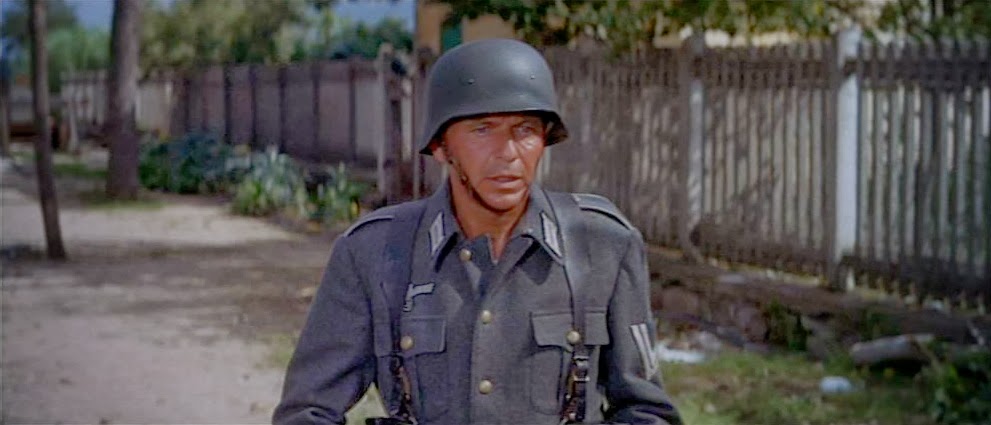I’m on a bit of a 1960s action adventure movie kick at the moment. Which brings me to Von Ryan’s Express, a World War 2 action flick about a mass escape of prisoners of war.
Colonel Ryan (Frank Sinatra) is an American flyer whose aircraft gets shot down over Italy in August 1943. He ends up in an Italian POW camp, and in the middle of a battle of wills between the camp commandant, Major Battaglia (Adolfo Celi), and the senior Allied officer among the prisoners, Major Fincham (Trevor Howard). The vast majority of the POWs are British with only a handful of Americans but Ryan is now the ranking officer among the prisoners.
Fincham is obsessed with the idea of organising escapes, even though it means exposing his men to extraordinary risks and to retaliatory action from Battaglia. Fincham has been stockpiling food and medical supplies for use in escape attempts even though his men are half starved and in urgent need of those medicines. Fincham and Ryan do not see eye to eye on this issue, and that’s putting it mildly. Ryan puts an end to what he regards as futile escape attempts - after all Italy is crumbling and it can only be a matter of weeks before the prisoners are freed by the advancing Allied armies. Ryan’s action is deeply resented by Fincham and by most of his men who take to referring to Ryan as Von Ryan.
Shortly afterwards Italy surrenders. The camp now has no guards. The prisoners are free. Well, sort of free. In fact they’re several hundred miles behind the enemy lines and the German Army is pouring into Italy to try to halt the invading Allies. They can leave the camp, but where do they go from there?
In the event they end up not going very far at all before being rounded up by the Germans and put on a train that will take them to a prisoner-of-war camp in Germany. Being a prisoner of the Italians was really not so very bad, but the prospect of being a prisoner of the Germans is considerably less inviting.
Ryan however has no intention of spending the rest of the war in Germany. He might have been opposed to escape attempts from the Italian camp but he is very much in favour of escaping from the prison train. This is obviously going to be very difficult indeed. Any hope of success depends upon the willingness of Ryan and Fincham, who have been at daggers drawn, to work together.
Hijacking a train full of armed German guards in the middle of German-controlled Italy seems like a suicidally bad idea but the very outrageousness of the idea works in its favour. Needless to say the train hijack sets up a string of action set-pieces all of which are extremely well executed.
Mark Robson had a somewhat bizarre career as a director. He did some excellent work for Val Lewton at RKO in the 40s, with The Seventh Victim being one of the best American movies of that decade. His later career was mixed to say the least. It included at least three legendary spectacularly bad movies, Peyton Place, Valley of the Dolls and Earthquake. What makes Robson interesting is that these three very bad movies are outrageously entertaining. They are also absurdly over-the-top. They’re trash, but they’re enormous fun. Von Ryan’s Express isn’t exactly trash but it certainly has a ludicrously over-the-top quality to it, and that sort of thing was right up Mark Robson’s alley. So it’s no real surprise that Robson does a great job with this movie.
The movie benefits considerably from the superb work of veteran cinematographer William H. Daniels. Daniels was one of the greats in his field. Sinatra liked his work so much he insisted on having him as cinematographer on most of his movies, which probably explains his presence here.
The working relationship of Ryan and Fincham is central to the movie. Despite their often very strong disagreements they are both brave and resourceful men. Even when they had disagreed both had believed they were doing the right thing. Eventually they find they can work together, and a mutual respect slowly grows between the two men. Trevor Howard is ideal for this sort of role, playing a rather stiff-necked character who finds it very difficult to admit he can ever be wrong, but a man nonetheless with enough strength of character to overcome these personality flaws.
Frank Sinatra was notoriously lax in his attitude towards acting, generally refusing even to consider the possibility of doing retakes. He just wanted to get the job finished and collect his pay cheque and very few directors were strong enough to persuade him to take a more professional approach. Despite this it has to be said that he had a great deal of acting talent and could, if a role actually interested him, deliver the goods rather impressively. His laid-back approach works to his advantage here, with Ryan’s rather quixotic attitude towards the war contrasting nicely with Fincham’s overdeveloped sense of duty. Ryan is a deceptively complex character, a man with strong principles that he hides under a veneer of devil-may-care nonchalance. Sinatra’s low-key performance ends up being very effective.
Howard and Sinatra get good support from Sergio Fantoni as an Italian officer, Captain Oriani, who throws in his lot with the Allied prisoners. Oriani’s attitude towards the war is as quixotic as Ryan’s and not surprisingly they get along well.
To make a good action movie you need more than just a lot of explosions. You need to make the action scenes inventive, and Von Ryan’s Express scores highly in this area. The bombing of the railway yards with the train speeding through and the climactic scenes on the railway bridges are particularly impressive.
Von Ryan’s Express is a classic action adventure movie and is a must-see for fans of the genre. Highly recommended.





No comments:
Post a Comment